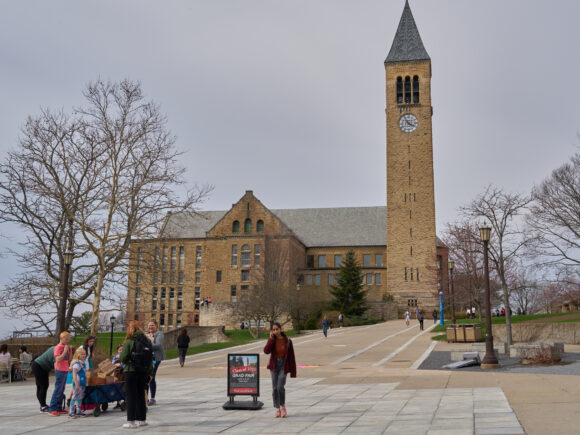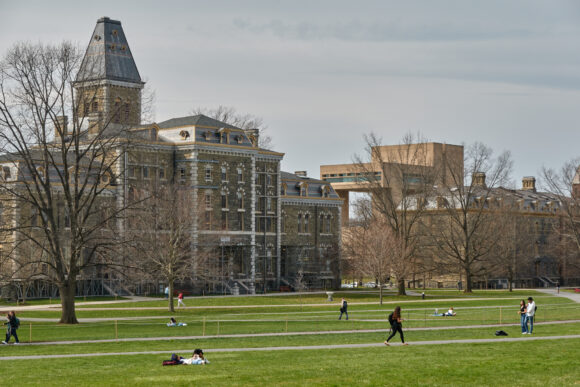Cornell University said it reached an agreement with the White House to restore about $250 million in federal funding, becoming the latest elite school to negotiate relief in response to the Trump administration’s campaign to remake higher education.
The Ithaca, New York-based college said Friday it had agreed to invest $30 million over three years in agricultural research, as well as pay an additional $30 million directly to the US related to ending pending claims brought against the school.
“The agreement explicitly recognizes Cornell’s right to independently establish our policies and procedures, choose whom to hire and admit, and determine what we teach, without intrusive government monitoring or approvals,” Cornell President Michael Kotlikoff said in a letter to the university community.

The decision makes Cornell the fifth university and fourth Ivy League school to ink a deal with the White House, after the University of Pennsylvania, Columbia, Brown and the University of Virginia. It is only the second to agree to pay a direct fine to the government, after Columbia committed to paying $200 million in July.
The White House lauded the deal in a statement, saying President Donald Trump delivered a “major win,” adding that “academic excellence, merit, and accountability will continue to be restored across America’s universities.”
The agreement doesn’t specify the imposition of an independent monitor, as was the case in a settlement reached between Columbia University and the federal government.
Bond Sale
Cornell, which has an endowment of almost $12 billion, had been feeling the financial pain of the government funding freeze for months. The school said in April it had received stop-work orders on more than 80 research grants from the departments of Defense and Agriculture, including for projects on cancer and heart disease as well as efforts to detect and prevent the spread of avian flu.
As the standoff dragged into June, Kotlikoff warned that the university faced austerity measures if crucial federal funding streams remained shut off, calling interim measures to plug budget gaps “not sustainable,” freezing hiring and announcing broad restructuring plans.
DEI Focus
The university also floated the possibility of raising roughly $1 billion through taxable bonds in a filing just a few days before signing the deal.
Friday’s agreement comes after the Trump administration aggressively pushed schools to dismantle diversity, equity and inclusion programs and criticized campuses for political bias, accusing universities of discriminating against conservatives.
Cornell’s agreement focused almost exclusively on anti-DEI reforms and alleged discrimination in admissions and hiring. Like the four other colleges that reached settlements, Cornell will provide data on applicants broken down by race, data the administration says it needs in order to ensure the school is complying with the Supreme Court’s 2023 ban on affirmative action.
Earlier White House deals with Columbia and Brown included commitments like cracking down on alleged campus antisemitism, reducing financial reliance on international students, and banning transgender athletes from participating in women’s sports teams.
Those issues aren’t emphasized in the Cornell agreement, but the university did agree to “conduct annual surveys on campus climate for Jewish students and comply with existing foreign gift reporting laws,” according to the text of the deal.
Education Secretary Linda McMahon called it a “transformative commitment” that will “end divisive DEI policies.”
“Universities are refocusing their attention on merit, rigor, and truth-seeking — not ideology,” McMahon said in a statement. “These reforms are a huge win in the fight to restore excellence to American higher education and make our schools the greatest in the world.”
Cornell’s decision is likely to increase the pressure on other schools to follow suit. Last month UVA became the first public university to sign an agreement with the administration, though it didn’t have funding frozen and the school’s deal didn’t include any financial commitment.
The administration’s biggest target, Harvard University, has filed two lawsuits challenging the government’s efforts to freeze research funding and block international student enrollment.
Harvard won a major legal victory in September when a federal judge ruled that the US illegally halted research funding and said the Trump administration “used antisemitism as a smokescreen for a targeted, ideologically-motivated assault on this country’s premier universities.”
Payment on those grants has been restored even as the government has vowed to appeal.
Top Photo: Students at the Cornell University campus in Ithaca, New York.
Topics Mergers & Acquisitions
Was this article valuable?
Here are more articles you may enjoy.



 Florida Regulators Crack the Whip on Auto Warranty Firm, Fake Certificates of Insurance
Florida Regulators Crack the Whip on Auto Warranty Firm, Fake Certificates of Insurance  CFC Owners Said to Tap Banks for Sale, IPO of £5 Billion Insurer
CFC Owners Said to Tap Banks for Sale, IPO of £5 Billion Insurer  State Farm Adjuster’s Opinion Does Not Override Policy Exclusion in MS Sewage Backup
State Farm Adjuster’s Opinion Does Not Override Policy Exclusion in MS Sewage Backup  Experian Launches Insurance Marketplace App on ChatGPT
Experian Launches Insurance Marketplace App on ChatGPT 

